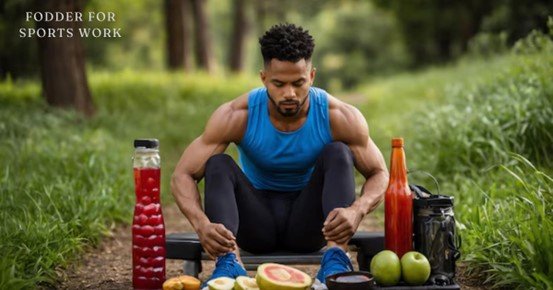When it comes to maximizing athletic performance, proper nutrition plays a pivotal role in determining success on and off the field. For athletes and sports professionals, finding the right fuel, often referred to as “fodder for sports work,” is essential. From improving endurance to speeding up recovery, the correct diet can provide the edge needed for peak performance.
In this comprehensive article, we will explore what constitutes ideal fodder for sports work, why it is important, and how athletes can optimize their nutrition to enhance their athletic abilities. We will also provide an in-depth look at how nutrition supports various types of sports, along with some practical tips, FAQs, and an informative chart to summarize key dietary elements.
What is Fodder for Sports Work?
Fodder for sports work refers to the nutritional elements and food intake designed specifically to fuel athletes and sports professionals. It encompasses a variety of nutrients, including carbohydrates, proteins, fats, vitamins, and minerals, all of which are crucial to an athlete’s overall performance and recovery process. In the same way that a high-performance engine requires premium fuel to run efficiently, athletes need specialized nutrition to excel.
Key Components of Fodder for Sports Work
To understand how fodder for sports work enhances athletic performance, it’s essential to examine the core components that make up an optimal diet for athletes:
- Carbohydrates: The primary source of energy for athletes, carbohydrates are crucial for endurance and stamina. They replenish glycogen stores in the muscles, which are depleted during physical activity.
- Proteins: Necessary for muscle repair and growth, proteins play a significant role in recovery post-exercise. Athletes need adequate protein to prevent muscle breakdown and to promote muscle synthesis.
- Fats: While fats often get a bad reputation, they are an important source of energy, particularly during prolonged low-intensity exercises. Healthy fats from sources like avocados, nuts, and fish are essential.
- Vitamins and Minerals: Micronutrients such as vitamins A, C, D, and minerals like calcium, potassium, and iron are essential for optimal body functioning. They support various bodily processes, including bone health, immune function, and oxygen transportation.
- Hydration: Proper hydration is often overlooked but is crucial for maintaining endurance, cognitive function, and overall athletic performance. Athletes should ensure they are drinking enough water before, during, and after physical activity.
The Importance of Fodder for Sports Work
Understanding the role that proper nutrition plays in sports is crucial for athletes looking to optimize their performance. Here’s why fodder for sports work is important:
1. Boosts Endurance and Stamina
Carbohydrates are the most important source of energy for athletes. Without adequate carbs, athletes may experience fatigue or a drop in energy levels, especially during extended periods of physical activity. Foods rich in complex carbohydrates, such as whole grains, oats, and sweet potatoes, provide sustained energy for longer periods, helping athletes maintain peak performance throughout a match or training session.
2. Enhances Muscle Repair and Recovery
Athletes put their muscles through intense stress, which leads to muscle fiber damage. Protein intake helps repair these fibers, allowing muscles to grow back stronger. Including high-quality protein sources like lean meats, fish, eggs, and plant-based proteins is vital for muscle recovery after strenuous workouts or games.
3. Improves Mental Focus
Nutrition affects not just the body, but the mind as well. Proper hydration and a balanced diet that includes healthy fats can improve cognitive function, reaction time, and decision-making. This is particularly important in sports like tennis, football, and basketball, where quick thinking and fast responses are key to success.
4. Supports Recovery Post-Exercise
After a workout, an athlete’s glycogen stores are depleted, and muscle fibers need repair. Consuming a meal rich in carbohydrates and protein within 30 to 60 minutes post-exercise can speed up recovery and restore energy levels. For example, a meal combining lean proteins like chicken or tofu with a carbohydrate source like brown rice or quinoa can be highly beneficial for recovery.
5. Prevents Injuries and Strengthens Bones
A balanced diet that includes adequate vitamins and minerals helps prevent injuries by strengthening bones and supporting joint health. Vitamin D, calcium, and magnesium are essential for maintaining bone density, while omega-3 fatty acids help reduce inflammation and support joint mobility.
Practical Nutrition Tips for Athletes
Whether you’re a professional athlete or a fitness enthusiast, these practical nutrition tips can help you optimize your diet for better performance:
1. Eat Balanced Meals
Aim to include a balance of carbohydrates, proteins, and fats in every meal. For example, a pre-workout meal could include whole-grain toast (carbohydrate), avocado (fat), and scrambled eggs (protein).
2. Stay Hydrated
Water is essential for performance. Dehydration can lead to a drop in energy levels and cognitive function. It’s important to drink water before, during, and after exercise to stay properly hydrated. In more intense training sessions or competitions, consider including sports drinks with electrolytes to replace lost minerals.
3. Time Your Meals
For optimal energy levels, eat a meal rich in carbohydrates and proteins 3-4 hours before training or a game. A smaller snack with simple carbs and protein, such as a banana with peanut butter, can be consumed 30 minutes to an hour before activity.
4. Recover with the Right Foods
Post-exercise recovery meals should include both carbs and protein. For example, a smoothie made with protein powder, almond milk, and fruits like berries or a plate of grilled chicken with quinoa can help repair muscles and restore energy.
5. Include Variety in Your Diet
A varied diet ensures that you are getting all the essential nutrients. Include different protein sources (animal and plant-based), a range of vegetables, fruits, whole grains, and healthy fats like olive oil and flaxseeds.
Key Nutritional Elements for Fodder for Sports Work
Nutrient |
Role in Athletic Performance |
Food Sources |
| Carbohydrates | Primary energy source, replenishes glycogen stores | Whole grains, oats, fruits, sweet potatoes |
| Proteins | Muscle repair and recovery, promotes muscle growth | Lean meats, fish, eggs, tofu, legumes |
| Fats | Provides energy during prolonged activity | Avocados, nuts, seeds, olive oil |
| Vitamins | Supports immune function, improves recovery | Leafy greens, citrus fruits, carrots |
| Minerals | Strengthens bones, maintains electrolyte balance | Dairy products, bananas, nuts, spinach |
| Hydration | Maintains endurance, prevents dehydration | Water, sports drinks, coconut water |
Conclusion
Fodder for sports work is not just about fueling the body; it’s about fueling performance, endurance, and recovery. Whether you’re an elite athlete or someone who enjoys recreational sports, the food you consume has a direct impact on your performance. By focusing on a balanced diet rich in carbohydrates, proteins, healthy fats, and essential vitamins and minerals, athletes can optimize their performance and achieve long-term success.
Proper nutrition is as important as training, and athletes should give careful attention to what they consume before, during, and after exercise. With the right fodder for sports work, every athlete can reach their full potential, avoid injuries, and recover faster after intense physical activity.
FAQs
What should I eat before a workout?
Before a workout, it’s best to consume a meal rich in carbohydrates for energy, along with a small amount of protein. For example, a bowl of oatmeal with banana slices or a turkey sandwich on whole-grain bread can provide the necessary fuel.
How important is hydration in sports?
Hydration is crucial for athletic performance. Dehydration can lead to fatigue, decreased cognitive function, and impaired muscle function. Drinking water consistently throughout the day and during exercise is key to maintaining performance.
What is the ideal post-exercise meal?
A post-exercise meal should include both carbohydrates and protein to restore energy and repair muscles. Examples include a chicken and quinoa salad, a protein shake with fruit, or Greek yogurt with honey and granola.
Can athletes benefit from supplements?
While a well-balanced diet should provide most of the necessary nutrients, some athletes may benefit from supplements, such as protein powders, omega-3s, or multivitamins, especially when their dietary needs are higher due to intense training.
How can I maintain energy levels throughout the day?
To maintain consistent energy levels, aim to eat balanced meals with a mix of carbs, protein, and fats. Including snacks like nuts, fruit, or yogurt between meals can prevent energy crashes.

